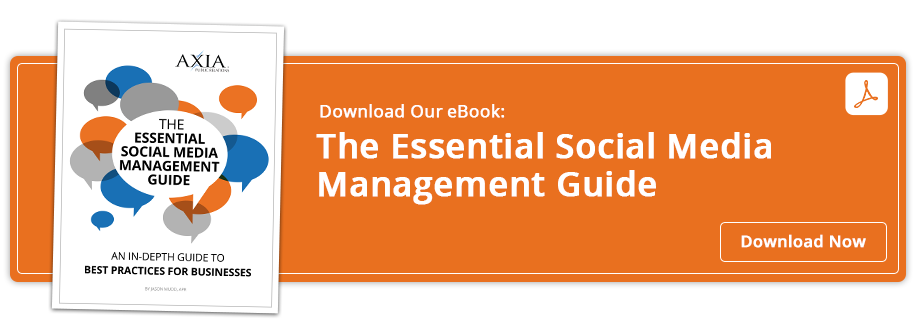This is one blog post about organic social media content. 4 reasons you should tailor content for different social platforms for more.
4 reasons you should continue to engage on social media
 A decade ago, the big question that public relations pros and marketers were asking themselves was: “Does a company or brand need to be on social media?” Since then, we’ve seen social platforms transform how people communicate, consume media, and how they shop. Whether the goal of your social media is to communicate messages or sell products, it’s safe to say that social media is a powerful tool for almost every company.
A decade ago, the big question that public relations pros and marketers were asking themselves was: “Does a company or brand need to be on social media?” Since then, we’ve seen social platforms transform how people communicate, consume media, and how they shop. Whether the goal of your social media is to communicate messages or sell products, it’s safe to say that social media is a powerful tool for almost every company.
As paid social media dominates feeds and becomes a more prominent way of reaching an audience, organic social media seems to increasingly fall to the wayside. So, is it still worth it to do organic social media in 2020? It is, indeed. Here are four reasons why.
1. Engage your top fans and stakeholders.
Facebook in particular is a tough nut to crack with organic engagement these days. That’s because the Facebook algorithm limits your reach so only a small percentage of your fan base actually sees your content. Who sees it? Largely, it’s those most engaged with your page already. That could be super fans who really like your brand or company as well as internal stakeholders, like senior leadership at the company. Both are important audiences that social media managers want to keep engaged.
2. Provide an outlet for customer service.
Gone are the days of calling a store or an 1-800 number for customer service. Today customers want immediate help and don’t want to have to pick up the phone to receive it. By having an active social media presence, you’re providing people an outlet to learn more about your company, express concerns, and ask questions. While it’s true customers often use social media to complain, an active response – and when possible, a solution to a problem – looks better for a company than unanswered questions and complaints.
3. Tell your brand’s story.
Having a paid social media strategy helps expand your reach and introduce or reinforce your brand to the masses. Imagine someone coming across your social media ad, clicking your profile to learn more about you, and seeing stale and subpar content. Keep the audience you build with paid ads engaged with compelling organic content.
4. Have a relevant voice on trending topics.
Viral moments happen in an instant. It’s difficult to predict when your brand may have an opportunity to chime in on a trending meme or online “battle of the brands,” so if you’re not engaged on social media, you’ll miss your moment altogether.
Want to learn more about social media blunders to avoid? Catch Axia Public Relations’ webinar “10 Social Media Blunders to Avoid” today.
Topics: social media



Comment on This Article